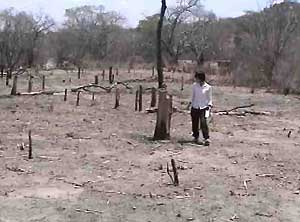| Period: 18 October - 16 November 2003. Country: Ethiopia, Tanzania |
| |
Purpose of the Visit |
| |
To Attend 21COE International Workshop on Integrated
Area Studies in Ethiopia, Study Tour in Southern Ethiopia and On-Site Education
in Tanzania |
| |
ITANI Juichi (ASAFAS: Division
of African Area Studies) |
| |
Record of Activities |
| |
10/18 (Sat) |
 |
Kyoto – Dar es Salaam |
| |
10/19 (Sun) |
 |
Dar es Salaam – Adis Ababa |
| |
10/20 (Mon) – 30 (Thu) |
 |
Attended COE International Workshop held at Addis Ababa
University, and joined Field Study Tour in Ethiopia |
| |
10/31 (Fri) |
 |
Addis Ababa – Arusha |
| |
11/1 (Sat) – 11/14 (Fri) |
 |
Conducted on-site education in northern Tanzania and Dar
es Salaam |
| |
11/15 (Sat) – 11/16 (Sun) |
 |
Dar es Salaam - Kyoto |
| |
Outcome
and Progress Report |
| |
- (1) Field Station Cooperative Workshop & Study Tour
- At the workshop entitled “21 COE International Workshop
on Integrated Area Studies in Ethiopia,” held at Addis Ababa University
from October 20 to 22, 2003 we discussed perspectives on “Area Studies.” After
the workshop, I was able to join a study tour to southern Ethiopia and observe
an indigenous farming system based on Ensete (Ensete ventricosum [Welw.] Cheesman)
cultivation.
- (2) On-Site Education
- I was able to carry out on-site education and research in Tanzania at two sites,
the central zone and the capital of Dar es Salaam. The former site is located
in the semi-arid zone of the central plain, covered with a unique vegetation
called Itigi thicket and inhabited by the Sandawe people, who were known as
hunter-gatherers until the end of the 19th century. Miss Yatsuka, a student
at ASAFAS, has undertaken ethno-botanical research on the Sandawe, and the
means for understanding and measuring several factors that formed the natural
environment were actually demonstrated to her in the field. In the latter site,
I gave concrete advice to Mr. Kawanishi, an ASAFAS student who has conducted
research in relation to the handicrafts made of African Blackwood by the Makonde
people, on understanding the realities of handicraft manufacturing and trading.
The Makonde originally immigrated into Tanzania as refugees from Mozambique
and have established a social status in Tanzania using their indigenous handicraft
techniques. Nowadays, Makonde handicrafts are among the most famous gifts in
East Africa.
- (3) Field Station Seminars and Collaborative Research
- Administration and security systems were built up for the field station. Two
students, Mr. Kawanishi and Miss Seko, who are studying the indigenous medical
system and changes in it around Mt. Meru in north Tanzania, presented progress
reports at the first open seminar held at the field station on November 5,
2003. Other ASAFAS students surveying in Tanzania, a researcher at another
university, JICA experts, and JOCV and resident Japanese in Dar es Salaam,
participated in the seminar and had wide-ranging discussions. Open seminars
will be held regularly.
At the Sokoine University of Agriculture located in Morogoro city, I had discussions
with the professors at the Center for Sustainable Rural Development (SCSRD)
about collaborations between ASAFAS and SCSRD.
|
 |
| Miss Yatsuka (ASAFAS graduate student)
observing a slash-and-burn field in an Itigi thicket
|
|
|
 Report
Report